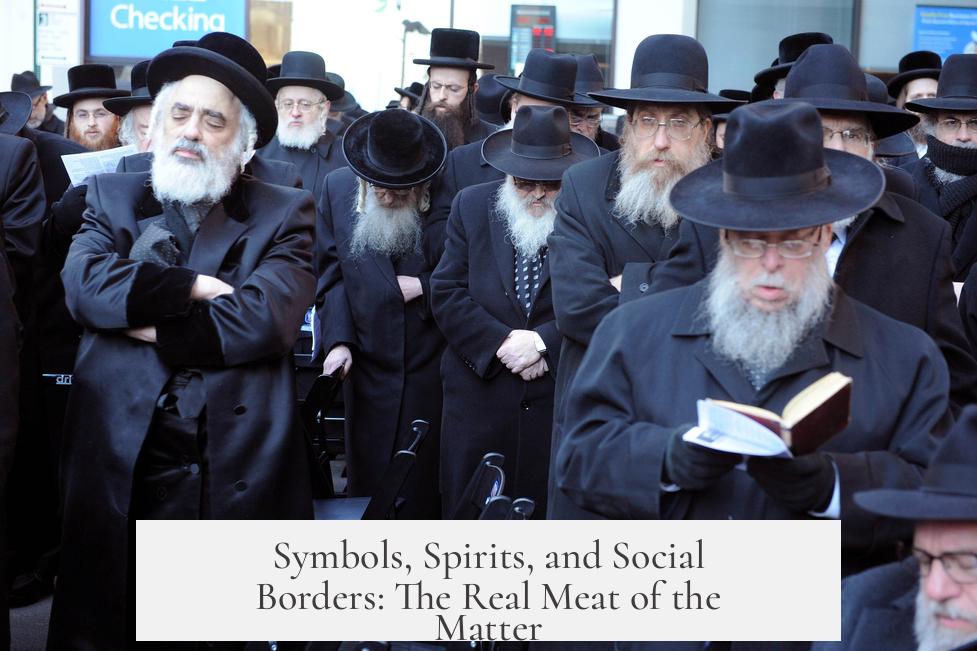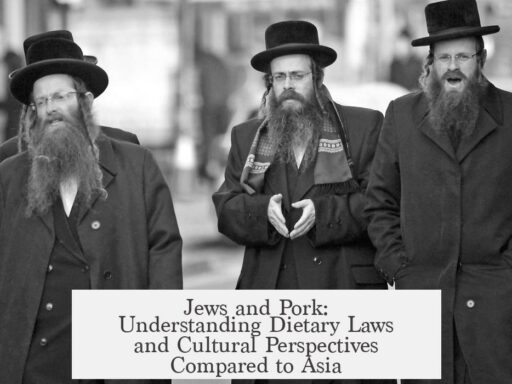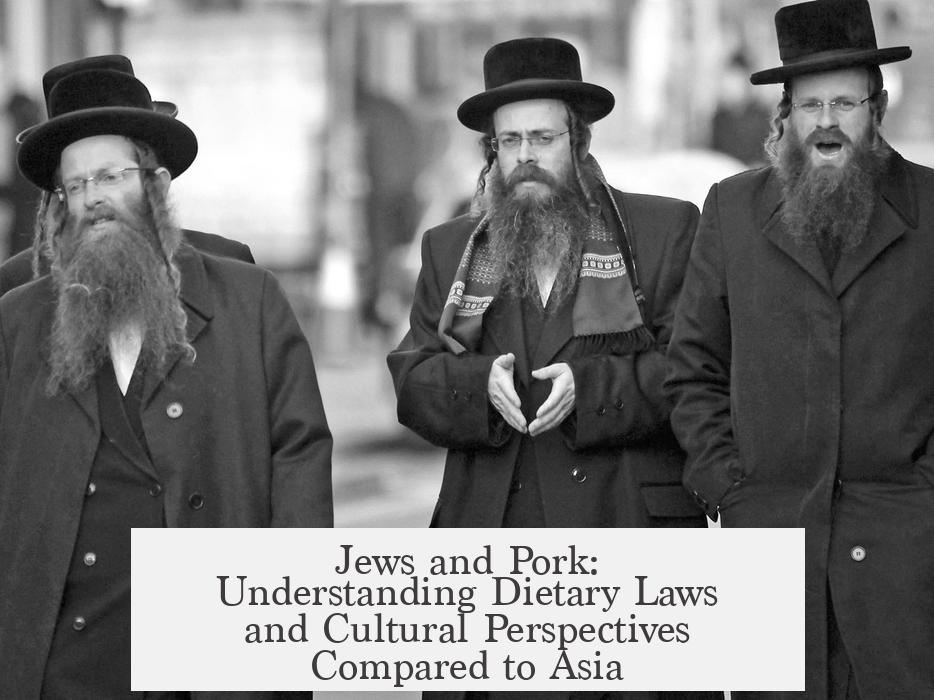Jews did not eat pork not primarily because it used to kill people, but due to complex religious and cultural reasons unlike other regions like Asia where pork consumption was common and did not cause widespread health problems.
The Jewish prohibition against pork originates in the Hebrew Bible, where pigs are classified as unclean animals. Many have speculated this ban arose from practical health concerns. Yet, available evidence challenges that view. Nearby populations, including those across Asia, consumed pork regularly without facing the high mortality rates often cited in such arguments (Hesse 1990; Hesse and Wapnish 1997).
One prominent theory argues the prohibition is symbolic rather than health-based. Philo of Alexandria suggested each animal holds symbolic meaning. He viewed the ban on pork as a measure against gluttony. Similarly, Kass (1994) interprets the dietary laws as curbing human desires for “omnivorousness and ferocity.” This frames pigs and similar animals as symbols representing excess appetite or aggressive instincts, which the laws aim to regulate.
Another angle considers psychological or cultural reactions. Sanders (1990) posits that the taboo emerges from a natural sense of disgust or cultural taboo rather than direct health risks. This highlights how food prohibitions can arise from collective beliefs and psychological patterns rather than empirical dangers.
The commonly suggested practical reason—that pigs are scavengers and may consume harmful materials tainting their meat—is insufficient to explain the prohibition. Douglas (1999) points out that many animals considered “clean,” such as cattle or goats, also scavenge opportunistically. Therefore, scavenging alone cannot serve as a valid criterion for declaring pigs unclean.
Douglas further proposes that the clean/unclean distinction emphasizes holiness and spiritual boundaries. The dietary laws mark a separation between the sacred and profane, categorizing animals not by practical traits alone but by spiritual significance. However, she acknowledges that the precise reasoning behind excluding certain animals, like non-ruminants with split hooves, remains unclear.
Some scholars attribute ethnic or political meanings to the dietary code. Eilberg-Schwartz (1990) argues that distinctions in cleanness symbolize the boundary between Israel and surrounding peoples. Prohibiting pork thus reinforces social identity and cultural cohesion rather than serving health purposes.
From a structuralist perspective, Soler (1997) suggests the laws reflect a theological compromise. In an ideal state, represented by the Garden of Eden, humans were vegetarians. Leviticus introduces a practical middle ground allowing consumption of some animals but excluding others, including pork.
Comparing these findings to pork consumption in Asia reveals a key difference. Many Asian cultures have long included pork in their diets without widespread deadly consequences from eating pig meat. This discrepancy suggests that if health risks had been the main driver of the Jewish pork prohibition, similar bans might have appeared in those regions. Since they do not, the hypothesis of health risks causing the ban loses weight.
| Explanation Type | Summary | Relation to Pork Ban |
|---|---|---|
| Symbolic/Moral | Animals represent human traits such as gluttony or ferocity | Ban on pork symbolizes restraint |
| Psychological/Cultural | Food taboos arise from collective disgust or cultural norms | Pork forbidden due to social taboo |
| Practical/Health | Pigs are scavengers and could carry disease | Rejected due to inconsistencies |
| Spiritual/Holiness | Clean/unclean foods mark sacred vs profane | Pork seen as spiritually impure |
| Ethnic/Political | Diet reinforces Israelite identity | Pork ban distinguishes Israel from others |
| Theological/Structuralist | Compromise between vegetarian ideal and meat consumption | Pork excluded as part of dietary limits |
Overall, the Jewish pork prohibition emerges as a complex interplay of religion, culture, symbolism, and identity. It does not primarily derive from concrete, widespread dangers associated with pork consumption. Other populations, including those in Asia, have consumed pork safely for millennia, which supports the interpretation that Jewish dietary laws serve unique spiritual and social functions rather than responding solely to health concerns.
- Jewish pork prohibition is not conclusively linked to health risks that killed people.
- Other Asian cultures consumed pork extensively without similar religious bans.
- Theories include symbolic, psychological, spiritual, ethnic, and theological rationales.
- Practical health arguments related to pigs’ behavior do not fully explain the ban.
- The dietary laws reinforce holiness and Israelite identity rather than mere food safety.
Jews didn’t eat pork because it used to kill people. Why wasn’t this a problem in other parts of the world like Asia?

The straightforward answer? Jews didn’t avoid pork solely because it once killed people—but more because of deep religious, cultural, and symbolic reasons. Meanwhile, many parts of Asia consumed pork regularly without clear, widespread health disasters tied to it. So, what’s going on?
Let’s unravel this tangled tale of dietary taboos, symbolic laws, and regional differences.
Why Jewish Law Forbids Pork: Not Just Because It’s “Deadly”

The Hebrew Bible’s explicit prohibition against pork appears mysterious. Indeed, many folks assume pigs carried fatal diseases, causing ancient Jews to shun them. Yet, scholars like Hesse (1990) point out neighboring peoples in the same region happily ate pork. They didn’t seem to suffer fatal outbreaks linked to pigs.
This reality weakens the idea that Jews avoided pork simply because it was dangerous or deadly. Pigs being “scavengers” who eat garbage might sound like a risk, but Douglas (1999) notes many so-called “clean” animals also scavenge occasionally. Why single out pigs for danger? That argument doesn’t hold water.
So, if health hazards aren’t the full story, what else explains the ban? The answer hides in symbolism, spiritual identity, and cultural boundary-making.
Symbols, Spirits, and Social Borders: The Real Meat of the Matter

Philo of Alexandria, a Jewish philosopher from around 2,000 years ago, sees the pork prohibition as a stand against gluttony. Not a health edict, but a moral teaching.
“Restrain your cravings,” he seems to say, “or you become less human.” Modern thinkers like Kass (1994) echo this: the dietary laws curb “omnivorousness and ferocity,” thrown in as symbols for self-control and civility.
Douglas (1999), fresh with insight, views the clean/unclean divide as a spiritual clue—holiness versus impurity. Eating pork was more than a meal choice; it marked where one stood in relation to divine commands and community purity. This lens shifts our focus from biology to spirituality.
Another juicy thought comes from Eilberg-Schwartz (1990), who saw pork as an ethnic or political symbol. Clean animals represented Israelite identity; unclean animals symbolized the “other” outside Israel. If ritual food laws were badges of belonging, eating pork crossed a cultural battlefield.
Finally, Soler (1997) suggests an evolutionary compromise. The Garden of Eden vision was vegetarianism, perfect and pure. But reality required eating some meat, just not everything. Rejecting pork fit into this “middle way”—a divine negotiation with human appetites.
Why Didn’t Asia Worry About Pork Like This?

In many parts of Asia, pork is a staple. From Chinese kitchens to Southeast Asian street stalls, pork thrives. These cultures didn’t weave pork into religious impurity or spiritual taboo, at least not widely.
Historically, Asian pig farming involved methods that limited parasite risks and disease spread. Plus, culinary techniques in Asia—like thorough cooking of pork—reduce health risks.
It’s also possible cultural and religious frameworks didn’t see pork as a spiritual marker. Different identities and cosmologies mean different rules for food.
The Jewish laws emerged in a unique context, heavily infused with identity preservation during exile and oppression. Other cultures didn’t share the same identity struggles, so pork remained food, not foe.
Practical Tips: What Can We Learn Today?

- Respect diverse food cultures: Understanding why some avoid pork helps us appreciate others’ identities.
- Cook pork thoroughly: Proper preparation minimizes real health risks.
- Recognize symbolic meanings: Dietary habits often carry more cultural weight than mere nutrition.
In Summary: Pork, People, and Perspectives
Jews’ avoidance of pork isn’t a simple “it kills people” story. Instead, it reflects a complex blend of spiritual laws, symbolic identities, and cultural boundaries. Meanwhile, many Asian cultures happily consume pork without the same taboos or health crises, shaped by different religious, social, and culinary traditions.
So, before we judge why certain groups avoid certain foods, let’s ask: What deeper meanings might their choices hold? Food is never just food. It’s history, identity, and sometimes, survival—wrapped in delicious, mysterious layers.
Why did Jews avoid pork if it wasn’t clearly a health risk?
The prohibition is linked to symbolic, spiritual, and ethnic reasons. It may represent moral restraint or cultural identity rather than clear health hazards.
Why was pork not a problem in Asia like it supposedly was for Jews?
Many Asian cultures consumed pork without widespread health problems. This suggests the Jewish ban was not about universal health risks.
Could pigs’ scavenging habits explain why Jews avoided pork?
This idea exists but is weak. Many clean animals also scavenge. So, scavenging alone doesn’t justify the ban.
Is the pork prohibition more about maintaining holiness than safety?
Yes. Some scholars see dietary laws as spiritual boundaries defining clean and unclean, not just food safety rules.
Did the Jews’ pork ban serve a political or ethnic purpose?
It may have. The laws helped mark Israelite identity, creating a boundary between them and other groups.




